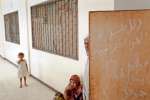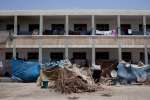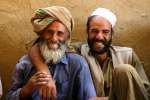Update on UNHCR's Shelter Programme
Crisis in Afghanistan, 2 February 2009
UNHCR Kabul Press Information, 2 February 2009
KABUL, Afghanistan, 2 February 2009 – Despite the difficult security conditions prevailing in parts of Afghanistan, UNHCR has completed nearly 100 per cent its shelter programme for the vulnerable returning refugees and internally displaced persons just as the winter weather across the country sets in.
More than 10,000 families- numbering some 60,000 individuals- mainly returnees in the rural provinces of Afghanistan, where a high proportion of returnees have settled down, benefited from the agency's shelter programme.
Launched in 2002, UNHCR's shelter programme is designed to help the most vulnerable households – especially widows, the disabled, or elderly. The shelter beneficiaries are a mix of recent returnees (2008) as well as IDPs.
Last year, UNHCR assisted more than 280,000 registered Afghans to repatriate from neighbouring Pakistan (278,000) and Iran (3,000). Many of them have returned to their places of origin, but some are unable to go back to their villages as they have no land, shelter or job opportunities.
The UNHCR shelter assistance is a community based programme. Eligible families are provided with shelter packages which include essential construction materials such as tools, wooden beams, a door, two window frames and nails to build a two-room house. Each of the 10,000 shelters has cost around 1500 dollars.
The regional breakdown of the shelter allocation in 2008 was as follow: East: 4,200, North: 2,100, Central: 2,100, Southeast: 1,000, West: 500, Central Highland: 100.
Overall, across the country since 2002, more than 180,000 families- around 1.2 million people- who otherwise would have not been able to live in their own homes, have been assisted to rebuild their lives after years of conflict. This is one of the largest UNHCR's programmes in Afghanistan.
UNHCR activities inside Afghanistan including the shelter and reintegration projects will continue in 2009. The shelter programme which has resulted in tangible changes in the lives of poor returnees, will see a further 10,000 shelters constructed in 2009.
UNHCR has allocated some 14 million dollars for its shelter programme in 2009 that will support 10,000 families in building their own shelters. This is expected to benefit approximately 60,000 individuals in provinces where returns remain high and where eligible returnees meet the criteria.
In spite of UNHCR's reintegration efforts such as shelter, water, returnee monitoring, coexistence and income generating projects to help make the return of Afghans sustainable, there are still gaps and there are many settlements sites where recent returnees from Pakistan are living on desolate, desert land and makeshift shelters.
The sustainability of returns and their successful reintegration in Afghanistan has a direct link to the improving economics in rural areas and provision of employment opportunities. Improved security conditions as well as better socio-economic conditions are key influential factors for sustainable return which needs long-term development projects nationwide.
More than 5.6 million Afghans have returned home since the fall of the Taliban regime in late 2001. Among them, over 4.3.5 million have repatriated with UNHCR assistance, mostly from Pakistan, Iran and other countries.












































